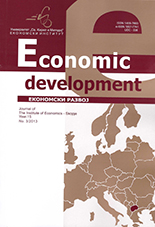Coordination of EU politics
Coordination of EU politics
Author(s): Ilija Gruevski, Vasilka Gaber, Stevan GaberSubject(s): Economy
Published by: Економски институт - Скопје
Keywords: fiscal policy; coordination; methods and principles; assessment; monetary policy
Summary/Abstract: The EMU framework for policy coordination relies on the assignment principle: the ECB is responsible for the single monetary policy, while other economic policies are carried out by governments under subsidiary principle respecting the rules and procedures laid down in the Maastricht Treaty and the Stability and Growth Pact (SGP). The policy assignment and institutional arrangements of EMU underline the importance of economic and monetary stability as a precondition for a smooth functioning of the monetary union. Policy co-ordination can be defined as supranational rules or norms which are agreed by all Member States, which leave primary responsibility for the policy area with national authorities, but set limits on their discretion. The EC Treaty mentions various forms of economic policy coordination: the broad economic policy guidelines, multilateral surveillance and the excessive deficit procedure. The maintenance of fiscal discipline is crucial for the credibility of the single monetary policy and sustained economic growth in the context of price stability. The aim of this paper is to analyze and discuss the coordination of fiscal and monetary policies in EMU, applied methods and principles of policy coordination, process of macroeconomic coordination and the assessment of the coordinative effects.
Journal: Економски Развој - Economic Development
- Issue Year: 15/2013
- Issue No: 3
- Page Range: 221-233
- Page Count: 13
- Language: English

